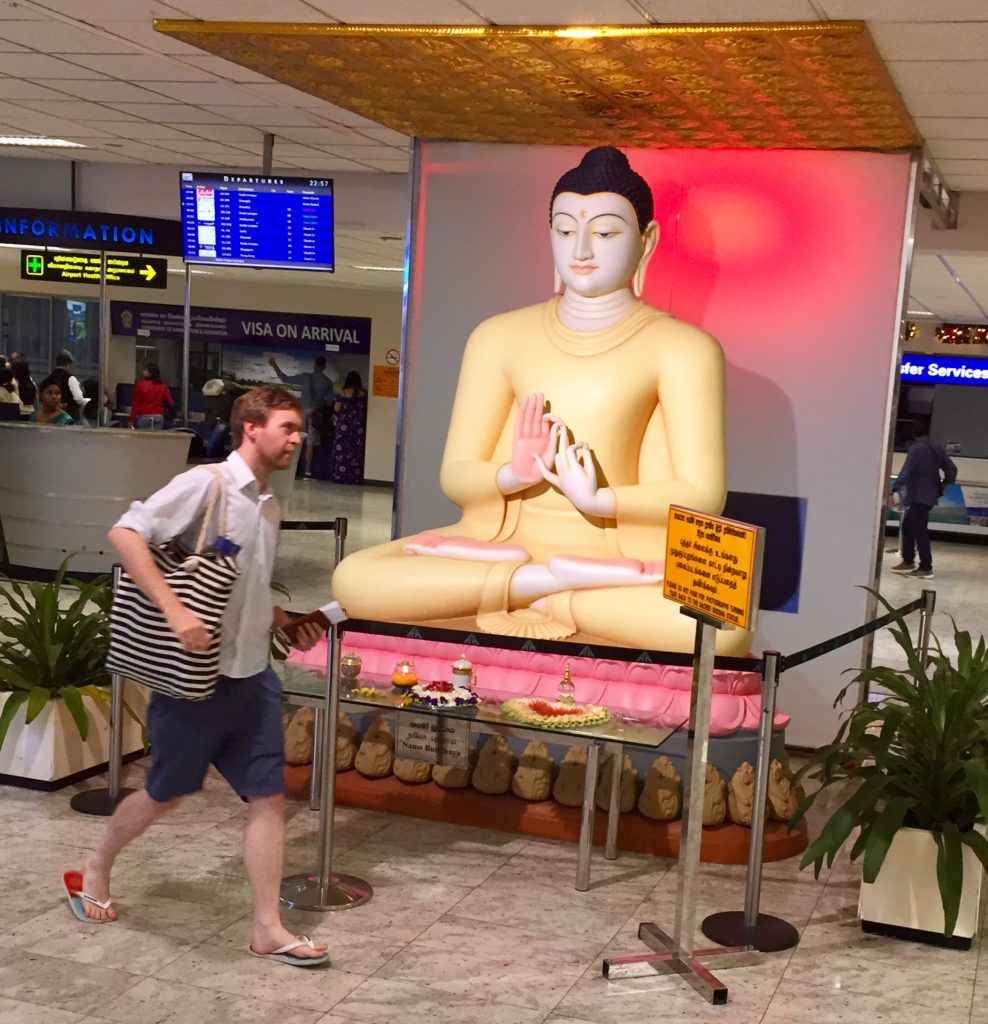Decades ago, Lee Kwan Yew wanted to model his fledgling island nation after the rising Sri Lanka. The future of this country rich in resources and strategically positioned between East and West boded well for Sri Lanka’s future and Lee admired what he saw. Unfortunately, due to corruption and civil war, Sri Lanka has yet to actualize its potential.
In the arrival hall at Colombo International Airport, I love being greeted by a huge statue of Buddha instead of advertisements for branded goods while further on, duty-free stores selling rice cookers and washing machines indicate the country’s place on its trajectory towards developed nation status. All over the island at intersections, roadside temples, under trees, statues of Buddha are both pervasive and pleasant reminders. However, despite a population that is 73% Buddhist, the 10% Muslim community (Arab traders settling here long ago) are the economic force. Entrepreneurial and family focused; they dominate multiple large businesses and are major landowners.
We are the guests of Shangri-La Resorts and are here to conduct art workshops and motivational talks for disadvantaged children. Previously, NGO’s serving various communities received funding from overseas. However, recently Sri Lanka was bumped up and out of ‘Developing Nation’ status and as a result grass roots organizations find it difficult to make ends meet. In our small way we try to fill a part of that gap through our workshops and talks, which directly touch the lives of poor and/or disabled children. We hope that by helping them express and know themselves better through art making they can build skills and self-confidence. The smiles we see on their faces after our sessions affirm that donating our time and energy makes a difference.
In our free time, we visit a number of sacred Buddhist sites of which there are many. In the south we climb up to the Mulkirigala Raja Maha Vihara where sleeping Buddha statues surrounded by colorful wall murals fill caves hewn out of the mountainside. In Colombo we enjoy the smorgasbord of objects collected as offerings at the Gangaramaya Buddhist temple. Dusty cassette players, ivory tusks an old Rolls Royce- countless gifts donated over the years clutter the sprawling complex. In Kandy we are moved by the devotion we feel and see by the thousands of Buddhists praying at the Temple of the Tooth where the holy relic is housed in a golden stupa accessible for viewing periodically to the public.
Religion is real but politics are a mess here. The Tamil civil war ravaged the country for decades. When I first arrived in Sri Lanka back in 1997 it was just a week after terrorists had blown up the newly constructed World Trade Center in Colombo, which had only been in operation for 3 days. Much has changed since the end of the civil war, but political challenges and corruption ensure Sri Lanka’s slow development, which impacts the lives of its 22 million inhabitants.
Government jobs are coveted, offering the assurance of an easy life and a pension. Young people who live at home and enjoy free education strive to graduate into white collar government jobs and complain when this doesn’t happen but then can return to homes where parents are only too happy to continue coddling them.
China offers loans and now has 99-year leases on prime real estate and shipping ports. Like many countries Sri Lanka has fallen into the trap of easy loans that tie the country up in debt for the foreseeable future. The influence in Colombo is pervasive with numerous gleaming new high-rise buildings are under construction, paid for with RMB and built by Chinese companies with imported Chinese labor.
Originally coffee was a major crop in Sri Lanka until a disease wiped out the plants and an enterprising Scot began growing tea instead. Cinnamon, tea and gems once fueled the economy, which now tries to shift to tourism. Hopes are that Colombo will become a financial hub for the region, which would hopefully help to fill the glut of luxury hotel rooms coming online soon. But even with recent political shenanigans aside, the possibility of Colombo becoming the Switzerland of the region seems a long shot.
I like this country, which reminds me of Thailand or Bali in the 1980’s. The people are friendly and respectful. In the bustling markets a peacefulness underpins the chaos. Vendors hawk their goods and warmly greet each other as men push carts laden with goods many times their own weight. The tuk tuks that roam the roads and move the masses may someday disappear but in the meantime they are my favorite way to see the sights. Though it would be easy to stay, we pack our bags and carry on, passing Buddha in the departure terminal on our way.










